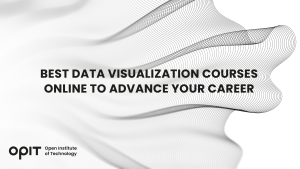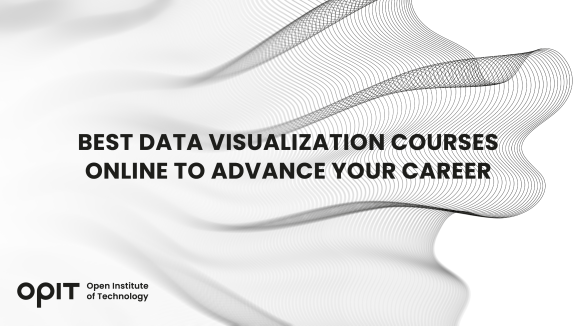

Data visualization is an essential skill in all areas of business and industry. The ability to take complex data and present it in a simple way speeds up decision-making and increases business agility. No wonder so many tech professionals are considering upskilling themselves with an online data visualization course.
If you’re a graduate looking for the best data visualization courses online, you might consider the Open Institute of Technology (OPIT). OPIT offers a Master’s Degree (MSc) in Responsible AI that includes a full segment on data analytics and visualization within the context of AI and other data sciences.
Let’s take a look at more reasons to start an online data visualization course and the benefits it can bring.
The Power of Data Visualization
Businesses thrive on high-quality data. The world generates 463 exabytes of data daily, much of which flows through busy organizations. While experienced data scientists may be able to gain snapshot analyses from complex datasets, most people can’t. That’s where data visualization comes into its own.
A data science and visualization course teaches students how to collect, cleanse, and analyze data before visualization transformations. This includes turning data into graphs, maps, or other graphic displays.
Data visualization turns raw data into usable insights. These insights allow business leaders to take action, change marketing campaigns, budget allocations, or even hiring policies. The ability to quickly see what needs to change allows businesses to edge ahead of competitors.
Choosing the Right Data Visualization Course
The best courses for data visualization teach these skills without taking busy IT professionals or data managers away from their current careers. Online courses provide flexibility and accessibility, allowing learners to study when it’s convenient for them.
Consider the following factors when choosing data visualization online courses:
- Duration
- Topics covered
- Support and student community
- Accreditation
- Career-aligned skills
- Certification
OPIT’s online courses cater to professionals with busy schedules by providing a high-level curriculum entirely online. OPIT is also fully EU-accredited and provides students with internationally recognized qualifications.
The Best Data Visualization Online Courses
Choosing data analysis and visualization courses online is tricky with so many options available. Here are five of the best currently available. Always take the above points on choosing the best online data visualization course into account before committing to a program of study.
Data Visualization with Python
This course from IBM via the Coursera platform looks exclusively at how to use the Python programming language for data analysis and visualization. Classed as intermediate level, some basic data management and programming knowledge is assumed. Tech professionals may find this course useful for upskilling themselves and learning some foundational data visualization skills.
Provider: IBM
Duration: 19 hours
Fees: $39 per month which includes access to other related courses
Qualification Gained: Digital course-specific certificate
Data Visualization Nanodegree Program
Udacity presents this “nanodegree” as a collection of four courses. The program introduces and then expands on data visualization and storytelling. Students will learn design principles, how to use Tableau, dashboard planning and design, and how to build a data story. There are also topics on data limitations and biases.
Provider: Udacity
Duration: Five months
Fees: Either month-to-month at $249 or four months for $846 (minimum $1,095)
Qualification Gained: Udacity Certificate of Achievement
Data Storytelling for Business
One of the few hybrid courses on our list, this storytelling and data visualization course does offer the option for an in-person class. However, you can also complete the program over two virtual seminars, each lasting three hours. This short course focuses on the three “Ds” of data storytelling: Define, Draft, Display, De-clutter, and Direct. It focuses primarily on helping business professionals deliver more effective, impactful presentations.
Provider: StoryIQ
Duration: One day in-person or six hours online with a follow-up session after four weeks
Fees: $230
Qualification Gained: Digital certificate of completion
Hands-On Tableau Training for Data Science
Tech professionals who want to get more out of Tableau could sign up for this software-specific data visualization online course. Tableau is a popular platform for creating data dashboards and is often used for business intelligence (BI) purposes. Students will learn about different types of visuals including charts, maps, graphs, and tables, with table calculations. There’s also a deeper dive into data aggregation and granularity.
Provider: Udemy
Duration: There are nine hours of lectures to complete at your own pace
Fees: $99 for this course but the platform has various subscription options available
Qualification Gained: Udemy Certificate of Completion
OPIT MSc in Responsible AI
For those searching for the best courses on data visualization for graduates, a master’s degree is usually the next step. OPIT’s Master’s Degree in Responsible Artificial Intelligence covers multiple AI-related topics, including data analysis and visualization. Students learn about the challenges associated with handling large, complex datasets. They cover data preprocessing, cleaning, and using that data to tell effective stories.
Provider: OPIT (EU-accredited higher education provider)
Duration: The fast-track option takes 12 months and the standard pathway takes 18 months
Fees: €6,500 — scholarships and discounts are available
Qualification Gained: Globally recognized MSc, equivalent to a Level 7 qualification worth 90-120 ECTS
Key Components of a Comprehensive Data Visualization Course
How do you choose which course is right for you? Your search should start by deciding why you want to take a data science and visualization course. If it’s simply for the joy of studying and learning new skills, one of the shorter courses might suit you. However, if you’re a graduate working in tech already, upskilling yourself will probably require investing in an MSc or similar-level course.
Here are some advanced topics tech professionals to look out for:
- Exploratory data analysis
- Crafting data pipelines in multiple programming languages
- Handling intricate datasets
- Data cleansing, processing, and integration
- Creating visualizations from multiple streams of data
- Linear and nonlinear dimensionality reduction
These skills can help you get ahead in your career by giving you the tools to work with data in any organization. Advanced data science skills are transferable and system agnostic, allowing you to apply for more roles at higher salaries.
OPIT’s Approach to Data Visualization Education
Why study with OPIT? Our unique teaching methods and course structure are deliberately career-aligned. We want to support busy professionals moving forward on their chosen trajectory. The best data visualization courses should allow you to work at your own pace, around your existing commitments.
Our teaching faculty is packed with top-notch academic leaders. We believe that choosing the right team makes the differences between good and great education. On the OPIT MSc in Responsible AI course, for example, you get to learn from Panagiota Katsikouli, a computer science researcher at the University of Copenhagen. Other top-flight faculty members include Pierluigi Casale, a principal data officer for TomTom, and Raj Dasgupta, an AI/ML research scientist at US Naval Research Laboratory.
Your course structure will include a balance of theory and practical hands-on activities. Students start with foundational theory, and then quickly learn how to apply this in real-life situations. For data visualization, expect to start with collating and cleansing data and move on to advanced analysis and presentation techniques. All courses are competency-based, with no final exams to stress about. You acquire new skills as you progress, making these courses ideal for career-minded tech professionals.
Integrating Data Visualization With Other Data Science Skills
Data visualization isn’t a standalone skill. That’s why integrating it with other data science topics such as AI and machine learning is essential. You want a skillset you can apply within your career, which means learning how it relates to various other aspects of data management. Data analysis is normally a primary step in effective visualization. However, analysis isn’t possible without first collating and processing data. The best data analysis and visualization online courses should naturally teach students how data visualization works with other data skills.
OPIT’s courses achieve this by empowering students to create industry-relevant data dashboards, pipelines, and stories. The MSc course culminates with a thesis, which is a research endeavor related to the student’s career ambitions. Learners are also encouraged to pursue internships to practice their skills and gain experience to help them achieve their career goals.
Make Sure You Choose the Right Online Data Visualization Course for Your Career
Choosing the best online data visualization course is essential to optimize your time and learn relevant skills. Make sure you understand the time commitment, cost, and qualifications you’ll gain at the end.
It’s also important to make sure you choose a trusted, accredited educational provider. OPIT’s accredited online programs could take you one step closer to your professional goals.
Explore the OPIT course offerings for more information on how we can further your tech career.
Have questions?
Visit our FAQ page or get in touch with us!
Write us at +39 335 576 0263
Get in touch at hello@opit.com
Talk to one of our Study Advisors
We are international
We can speak in:




